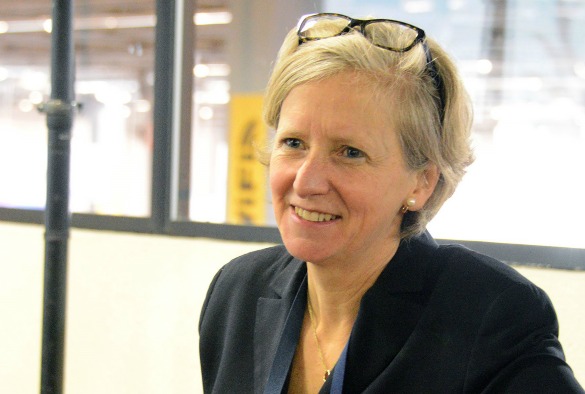Professor Sarah Coupland, from the University’s Institute of Translational Medicine, is the first UK recipient of the International Council of Ophthalmic (ICO) Pathology award for her international contributions to research and teaching in the field of eye pathology, particularly uveal melanoma.
ICO works with ophthalmologic societies and others to enhance ophthalmic education and improve access to the highest quality eye care in order to preserve and restore vision for the people of the world.
Approximately half of all patients who develop a melanoma, a tumour, in their eye will be treated and make a full recovery. The other half will go on to develop secondary cancers elsewhere in the body, usually the liver, which can be very difficult if not impossible to treat.
Providing accurate results
Professor Coupland’s research has involved examining these tumours in more detail, specifically looking at multiple chromosomes at the same time, enabling them to differentiate between those two types of cancers. This provided more accurate results in prediction of tumour spread enabling clinicians to be more confident that their patients wouldn’t develop any secondary cancers.
Professor Coupland leads the University’s Liverpool Ocular Oncology Research Group (LOORG) and the North West Cancer Research Centre (NWCRC), which was the first centre worldwide to be able to predict the survival rate of someone with uveal melanoma.
Professor Coupland, said: “Today, not only can the clinicians in the cancer centre and my research team tell what type of eye tumour a patient has, we can predict their clinical course and ultimately their chances of survival.
“People want to understand if their outcome is good or bad, they want to be able to prepare and feel that they are fully informed. Knowing this information helps clinical teams to monitor those patients who are at higher risk of developing a second tumour in their liver. In these patients we aim to detect the cancer in the liver earlier and remove it, which in turn improves people’s chances of surviving. We can also recruit patients into clinical trials which are being run here by the cancer team.
“We are moving away from a ‘one size fits all’ approach to treating patients. Everyone is unique and each tumour is different. To predict how an illness will develop based on the study of a tumour and then to create a treatment plan especially for that person is a challenge but something we strive to perfect. Liverpool is leading the field in this area and is world renowned for it.”
New treatments and therapies
Although there is no cure for secondary cancers caused by uveal melanoma yet, Professor Coupland is part of a team dedicated to finding one. A European Consortium called UMCure 2020 is a project to bring together specialist centres and scientists across the globe to develop new treatment targets and therapies for this deadly disease.
On winning the ICO award Professor Coupland, said: “For me, receiving this award is something very special. Professor Naumann, who jointly founded the award with his wife, contributed so much to eye pathology; he’s considered one of the ‘greats’ in this area
“I’ve always been a determined and ambitious person and I’ve been lucky to work with such dedicated people. I see the award as an acknowledgement to the service pathologists provide to doctors and surgeons as often we are the forgotten link in a patients care pathway. So, yes, it’s definitely a career highlight…and I may end up writing a text book, which people have been encouraging me to do for some time, after all..!”
Professor Coupland presented the ‘Naumann Lecture’ at the World Ophthalmology Congress in Barcelona earlier this month following the receipt of her ICO award.
Since 2013 Professor Coupland has held the title of George Holt Chair of Pathology, a role which has been held by men since it was first established, over 100 years ago in 1894.
